|
What's your favourite boxing movie? Raging Bull? Rocky? Million Dollar Baby? Fat City perhaps? I've no problem with any of the choices there. Raging Bull in particular has become a standard setter for this particular sub-genre, for the clout of its drama, for its dynamite performances and direction, and for the brutal realism of its fights. De Niro famously trained and fought as a fighter in preparation for his role as real-world boxer Jake LaMotta and it shows in the authenticity of his battles both in and out of the ring. Yet in spite of my deep admiration for the above listed films, my favourite boxing movie is not American in origin, but Japanese.
The sporting link aside, Tokyo Fist [Tōkyō-ken] is a very different film to its distant American cousins. It's darker, more confrontational, more thematically ambitious and more visually stylised. It favours metaphor over realism and its boxing is more ferocious and energetically charged than anything you'll find in these other fine films. It's also stranger and more dangerous. Tokyo Fist is true outsider cinema at its most cinematically thrilling.
The work of brilliant Japanese maverick writer-director Tsukamoto Shinya (who is also the film's producer, cinematographer, editor, art director and lead actor – auteur indeed), Tokyo Fist has on occasion been wrongly credited as his third feature. Tsukamoto had already completed a number of 8mm films by the time he made his breakthough work Tetsuo: The Iron Man, a few of which qualify as feature length. And between Tetsuo and the 1992 Tetsuo II: Body Hammer he made the oddball fantasy horror Hiruko the Goblin [Yōkai hantā: Hiruko]. But Tokyo Fist is the film that really cemented Tsukamoto's post-Tetsuo distinctive cinematic style and thematic concerns.
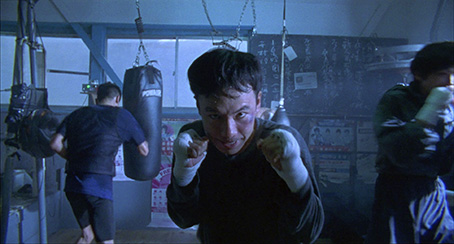
Despite occupying just a minute of screen time, Tokyo Fist has what for me remains the most electrifying and ball-grabbing pre-title sequence in all of Tsukamoto's cinema, one that slyly sets up several of the film's underlying themes. The pounding techno-rock tune that drives it also underscores the furiously energetic centrepiece, where the boxers at the gym at which both Tsuda and Kojima train run through their paces as if fired up with speed and driven half crazy at the prospect of ever losing a fight. It's an explosive sequence that is organically bonded to the camerawork and editing in a way that vividly captures – more so than any other training scene I've ever seen in a film – both the physical demands of the sport and the mindset and fierce determination required to succeed in it.
But I've been here before, having reviewed the film itself back in January 2005 when I covered Manga's November 2004 UK DVD release, which can read here, a review I still stand by and that covers (more concisely than usual) what for me makes the film such terrific cinema.
It's hard to express how excited I was when I heard that Tsukamoto himself was digitally remastering the film from its original negative and that Third Window were to release it on UK Blu-ray. I know we're all the victims of the vagaries of personal taste, but I've never understood why the work of a director of such extraordinary vision has previously been so half-heartedly supported by UK distributors. I tend to take it personally because Tsukamoto is not just a director whose work I admire, but one of my all-time favourite filmmakers and my absolute favourite modern Japanese director. He is the very definition of an outsider filmmaker, one who refuses to compromise his very individualistic approach to cinema and attract the big buck funding and whose most recent work, Kotoko, is every bit as much a Tsukamoto Shinya film as Tetsuo or Tokyo Fist. And Michael Powell and Emeric Pressburger aside (and you can put that down to a multi-review coverage of box set of their films), I have a feeling that we've reviewed more films by Tsukamoto Shinya on Cine Outsider than those of any other filmmaker, living or dead.
Yet a sizeable number of his work remains frustratingly unreleased in the UK, including his superb 1999 Sōseiji [Gemini] and both of his Nightmare Detective films. When they have have made it out on UK DVD, the quality has rarely been anything to shout about. Manga's disc of Tokyo Fist was non-anamorphic, grubby in its rendering of darker scenes and blessed with burned-in English subtitles that were peppered with errors. Arts Magic did better by the film's thematic companion piece, Bullet Ballet with an anamorphic transfer, but the results were still a some way short of ideal, and the transfer on Terra's disc of Haze was shockingly poor. Tartan did better with A Snake of June and a lot better with Vital, but it was with Third Window's Blu-ray releases of the digitally remastered Tetsuo and Tetsuo II and their pristine disc of Kotoko that the tide finally began to turn. Now we have remastered Blu-ray and DVD editions of Tokyo Fist and Bullet Ballet, both of which are huge improvements over any home video predecessors. Which begs one small question: is Tsukamoto going to continue remastering his earlier films and are Third Window going to continue to release them on UK Blu-ray and DVD? If so, could we finally see Sōseiji, one of Tsukamoto's most visually sumptuous works, get the UK release it has for so long deserved?
OK, the previous UK DVD release of Tokyo Fist had a lot going against it, giving this remastered Blu-ray some serious leeway for improvement, and that's just what it delivers. Unsurprisingly, the level of detail here far surpasses that on Manga's non-anamorphic transfer, particularly as that was clearly struck from an overseas release print (the burned-in Americanised subtitles give that away) and the new transfer was remastered from the original negative. But there's more. I expected to have to get a short way into the film before improvements in other areas became more apparent, but that's just not the case. In the pre-title wide shot of the ring full of furiously active boxers there is clear picture detail that on the previous release was lost in an indistinct grey gloom. Direct comparisons also reveal that there is more picture information on at least three sides on the new transfer than on the previous DVD.
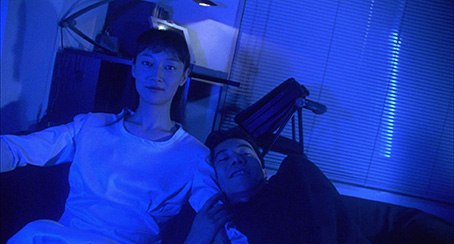
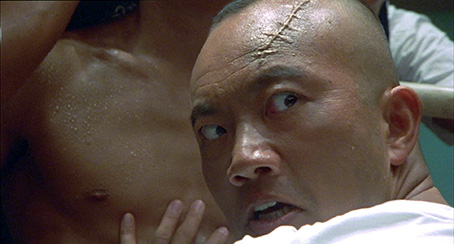
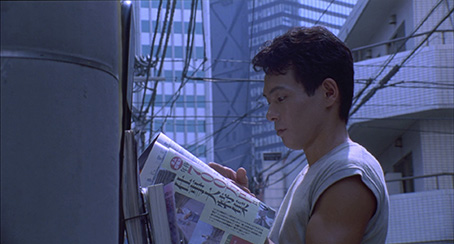
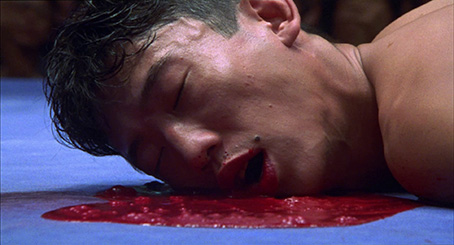
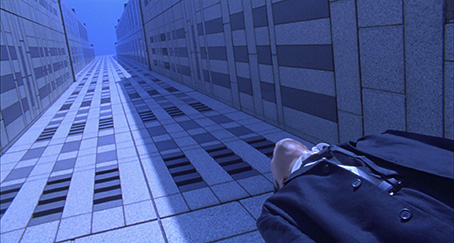
Tsukamoto's use of strong coloured lighting and filtration is vividly reproduced here and the more naturalistic coloured scenes are attractively rendered. There is some inconsistency in the level of visible grain. This may – and I'm speculating here – be the result of the use of different film stocks or pushing the film speed for different lighting conditions, as the grain appears to be more prominent in scenes where the light levels are low or have a strong coloured hue, much of which appears to have been achieved in-camera (scenes are rarely dominated by a single colour, and filtering lights to this level always knocks a few stops off the exposure). This does tend to take the edge off the contrast, as it's nigh-on impossible to achieve solid black levels when the image is made up of differing shades of blue. Detail is also a little softer in some of these sequences, though this also varies, often depending on the intensity of the tint. The colouration is deliberate, however, and the pitch of the resulting image feels absolutely right. When the colour tinting is less aggressive the results are often strikingly good (daylight exteriors and in-ring fights are prime examples), with a fine contrast range, good shadow detail, pleasingly rendered colours and a strong level of detail giving the image a punch that it's never had before on home video versions, and really bringing home just how good a cinematographer Tsukamoto can be. As you would expect, the picture is spotless and free of any damage. All in all, a first-class job.
The DTS-HD Master Audio 2.0 stereo soundtrack is also a noticeable step up from its Dolby 2.0 predecessor, in volume, clarity and the fullness of the sound, something again instantly evident in the music-driven opening. The dynamic range is also impressive, with Ishikawa Chu's music and the use of ominous rumbles really registering here.
Original Japanese trailer (0:44)
A fabulously kinetic and wordless sell built around the film's driving main theme.
Music Video (4:12)
A frantically shot video of an unidentified but impressive rock band thrashing out two tracks on guitars and banged metal (imagine a Japanese Test Department and you're halfway there). The second is titled Move On, which appears to be the main theme from Tokyo Fist – it's been modified enough here for me not to be completely sure.
Tokyo Fist UK Trailer (2:30)
An initially calmer trailer than the Japanese original, but it eventually lets rip in appropriate fashion. I have a personal fondness for if because it quotes my earlier review, just slightly out of context but in VERY BIG TYPE!
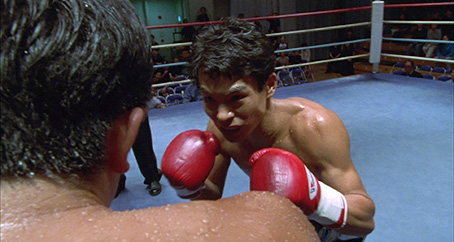
The key extra is an Interview with director Tsukamoto Shinya, which is divided into three unequal parts, with the main interview followed by two short appendices.
About Tokyo Fist (18:09)
Tsukamoto discusses what inspired him to make the film, the casting of his brother in the role of Kojima, Hizuru's attraction to physical violence, the relationship between the characters and the city around them, boxing as a release for suppressed male aggression, the process of writing instinctively rather than logically, and more, all in enthralling detail.
About Tokyo Fist and Bullet Ballet (3:23)
Here Tsukamoto talks about the ideas he wanted to portray in both films, how acting in his first play changed him as a person, and his surprise at the idea that he might be attracted to miserable characters. As someone who has written about the two films as thematic blood brothers, I was hoping for more on their relationship to each other than we get here, but this is still interesting stuff.
General Thoughts (4:18)
Tsukamoto here talks about his love of film as a recording medium (like a number of old school film editors I've spoken to, including one of the key writers for this site, he loves not just the look of film but its tactile physicality), but also the practical advantages of shooting digitally, particularly when working at speed on a low budget.
Watching Tokyo Fist again after a break of a couple of years and without any of the distractions that come with a sub-par transfer proved one of the cinematic highlights of my year. Much as I adore the first two Tetsuo films, it's here that the Tsukamoto style I've been in love with for years first feels fully formed, with a potent subtext organically wedded to a compelling narrative and intensifying until it hits fever pitch, where it overwhelms and completely engulfs the drama. Tokyo Fist is electrifying outsider cinema and this is the edition fans have always dreamed of owning. Highly recommended.
|